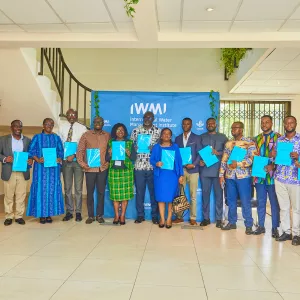Signed, Sealed and Scaling: Formalizing a Collective Commitment for Circular Bioeconomy Innovation
Authors: Dzifa Agbefu, Eric Nartey (PhD)& Susanne Bodach (PhD) International Water Management Institute The Journey Begins More than two years ago, IWMI posed a crucial question: How can we break through the barriers to scaling circular bioeconomy solutions in Ghana? The answer was not another project; it was a collective platform built on collaboration, innovation, and shared vision. On June

Signed, Sealed and Scaling: Formalizing a Collective Commitment for Circular Bioeconomy Innovation
Authors: Dzifa Agbefu, Eric Nartey (PhD)& Susanne Bodach (PhD) International Water Management Institute
The Journey Begins
More than two years ago, IWMI posed a crucial question:
How can we break through the barriers to scaling circular bioeconomy solutions in Ghana?
The answer was not another project; it was a collective platform built on collaboration, innovation, and shared vision.
On June 17th, that vision took shape. IWMI together with 15 institutions, collectively called ‘co-owners’ signed a Memorandum of Understanding (MoU) to formalize the operations of the Circular Bioeconomy Innovation Hub (CBE-Hub) in Ghana.
More Than a Signature
The MoU did not just mark the start of a relationship, it formalized two years of co-design, mutual support and meaningful progress. These 15 institutions, who are co-owners of the Hub, have already been walking the talk. They provided: training and research spaces through the living labs, knowledge resources and diverse technical expertise to support training.
The signing ceremony was a celebration of their commitment to keep doing the hard, necessary, and inspiring work to drive circular bioeconomy innovation forward and doing so together.
Why This Matters Now – Now more than ever
In Ghana, over 60% of municipal solid waste is organic. With rapid urbanization and population growth, waste volumes are rising with much of it ending up in landfills. This contributes significantly to methane emissions, a potent greenhouse gas accelerating climate change. Many organizations have been working on circular models to address this issue, but efforts have often remained fragmented, uncoordinated, and isolated. Without shared platforms, lessons go unlearned. Without collaboration, efforts are duplicated. And without scale, many good ideas fail to create lasting change.

The Solution: A Hub for Circular Innovation
The CBE Hub was created to change that. Facilitated by IWMI, the Hub is a multi-stakeholder platform that serves as a one-stop-shop for applied research, training, advisory support and knowledge sharing in the organic waste-to-resource value chain. It is based in Ghana but designed to serve the broader West Africa region, bridging knowledge gaps, creating synergies across projects, and unlocking bio-based investments that benefit people, planet, and economy.
Momentum is Building
The Hub’s impact has already earned international recognition, including a feature in CGIAR’s inaugural flagship report. Milestones include:
a 1. The RRR Schools and Youth Program,
- Training Value chain actors in circular practices
- Contribution to the Ghana National Environmental Sanitation Policy Revision
- Hands on training and applied research at the living labs
Now, with the MoU signed and support from CGIAR’s Food Frontiers & Security and Multifunctional Landscapes programs, the Hub is poised to mobilize greater investments to expand its reach and scale up proven models.
Be part of the movement
Passionate about driving change in, sanitation, agriculture, climate, or policy through circular bioeconomy? Join forces with the CBE Hub—whether it is through research, training, investment, or field-based action.
🔗 Learn more about the Hub [Home | Circular Bio-Economy Innovation Hub],
🔗 Schedule a visit to our Living Labs [here],
🔗 Sign up for our newsletter [here] and be part of the journey!

